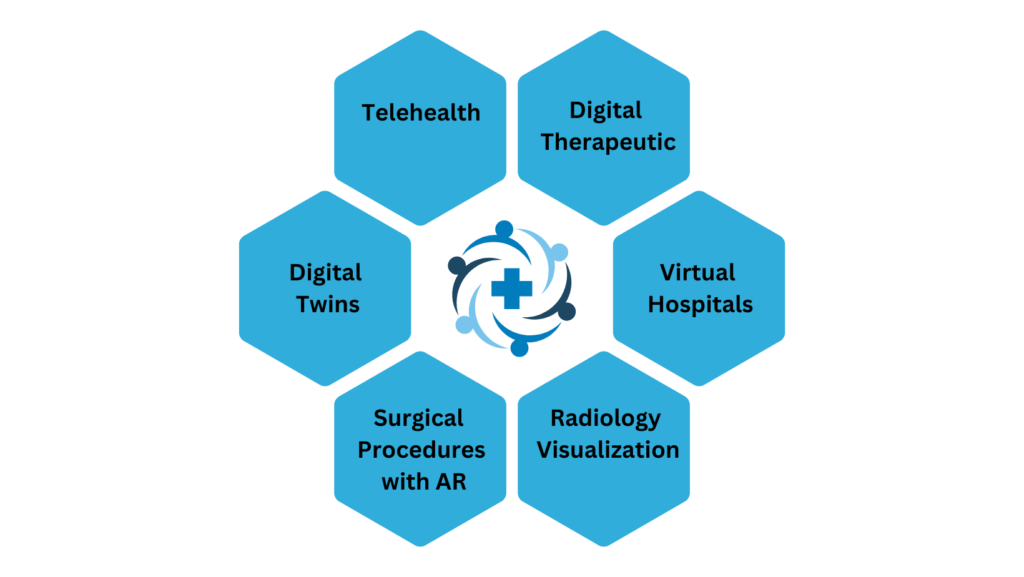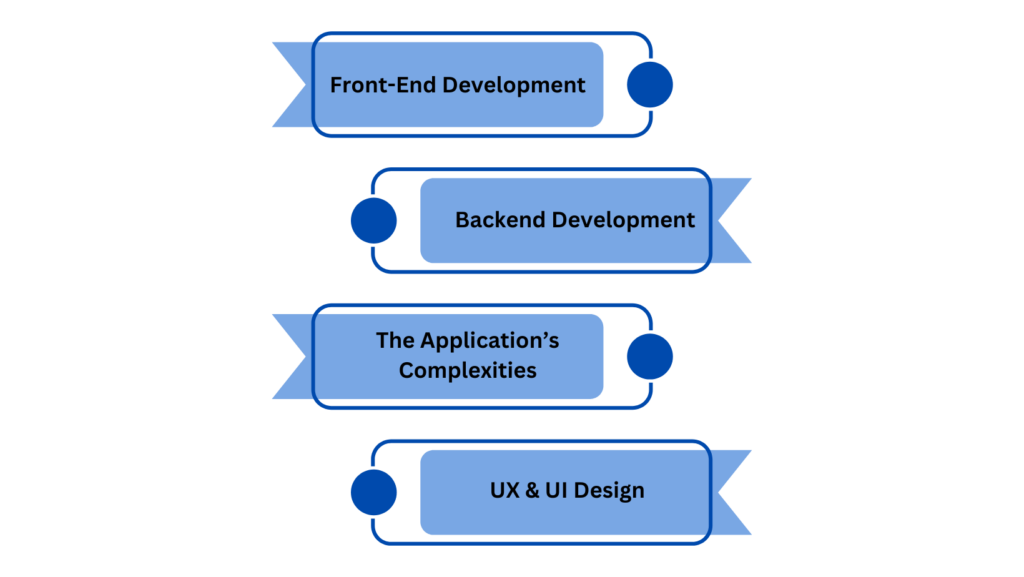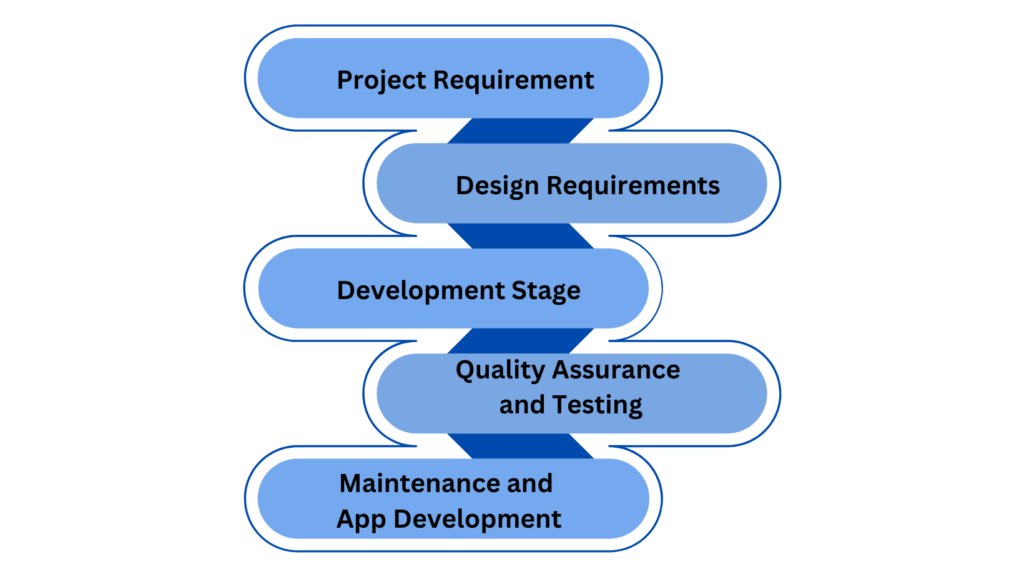Dealing with challenges like enhancing patient care and making operations more efficient is common in healthcare. Traditional healthcare systems often struggle with problems like sharing data, ensuring safety, and spreading medical information effectively.
The metaverse in healthcare is a game-changing solution. It creates immersive digital environments that are connected, helping the healthcare industry stay competitive in the ever-changing digital world. The use of the metaverse in healthcare is always progressing, bringing about innovative changes in technology.
Physicians are accessible based on your needs through virtual clinics, where there are no language barriers between doctors and patients. In healthcare’s metaverse, professionals can concentrate on patient care, cut down on expenses, and improve the precision of diagnoses.
According to a Markets and Markets report, the global metaverse in the healthcare market is anticipated to achieve $79.6 billion by the conclusion of 2028, with a compound annual growth rate (CAGR) of 52.9% from 2023 to 2028.
The foundation of the healthcare metaverse relies on two crucial elements: qualitative and quantitative data. Prominent healthcare leaders and companies leverage this valuable information to tailor effective marketing strategies for their products and services.
Metaverse in Healthcare: Advancements and Opportunities
The metaverse is demonstrating innovative methods for delivering robust healthcare services. Scientists and researchers are utilizing the metaverse as a platform for conducting healthcare experiments in a virtual setting.
In essence, the metaverse has significant potential to transform the healthcare sector, introducing cutting-edge approaches that improve patient access, the quality of treatment, and service efficiency.
Take a glance at the opportunities that the metaverse presents for the healthcare industry:

Telehealth
The integration of telemedicine with the metaverse has eradicated physical limitations. Telehealth gained popularity during the pandemic, gradually replacing in-person consultations or visits with healthcare professionals for a majority of patients and caregivers.
Incorporating the metaverse opens up vast possibilities by addressing urgent health needs and ensuring the provision of healthcare services. It enables patients to connect with healthcare experts within the convenience of their virtual environment, offering both ease and accessibility. Moreover, the metaverse proves highly beneficial in facilitating accurate diagnostics and personalized treatment plans, promoting interdisciplinary care.
Digital Twins
A digital twin serves as a virtual simulation for understanding the intricacies of any process, system, or product by utilizing real data. This innovative concept is envisioned to act as a valuable tool, resembling “test dummies” for users. Its applications extend to predicting various scenarios, ranging from post-surgery recovery trajectories to anticipating how patients will react to specific medications.
Surgical Procedures with AR
Leveraging augmented reality (AR), it becomes feasible to generate 3D models of internal body structures using imagery from diagnostic techniques like X-rays and CT scans. The application of metaverse in healthcare fosters a positive environment, empowering surgeons to acquire and hone skills in intricate surgeries with remarkable precision.
Radiology Visualization
Healthcare professionals often face a significant challenge when it comes to reviewing medical images in a step-by-step manner on 2D displays. Improving the capability to visualize medical images represents a promising area for enhancing diagnosis and surgical preparedness. The incorporation of the metaverse into healthcare presents possibilities for more immersive and impactful medical experiences.
Within the realm of metaverse applications in healthcare, virtual reality is extensively employed to provide immersive training for medical robots. Additionally, an augmented reality imaging solution integrates machine learning algorithms to simultaneously provide crucial image data to surgeons, supporting surgical planning and educational objectives.
Virtual Hospitals
Establishing a virtual hospital within the metaverse grants hospitals access to a broader geographic reach, reduced operational costs per patient, decreased readmission rates, shorter wait times, and various other benefits.
The swift progression of virtual hospitals is made possible through the integration of technologies such as cloud technology in healthcare, AR/VR, IoT, and notably, the metaverse in the healthcare sector.
Physicians can remotely observe the health status of their patients in hospitals, eliminating the necessity for in-person visits. Conversely, patients can take more proactive roles in monitoring their health. At Digiatto IT Service, we created a healthcare application similar to YouCOMM, a messaging platform enabling patients to seek assistance and convey their needs to hospital staff through pre-recorded messages, voice commands, and head motions.
Digital Therapeutic
Signs are emerging that digital therapeutics offer significant opportunities within metaverse healthcare. The realm of digital therapeutics is rapidly growing, encompassing applications such as cognitive therapy, support groups, psychiatric assessments, rehabilitation, and, aided by haptic sensors, even physical therapy facilitated by VR and AR technology in the metaverse for healthcare.
Analyzing the Factors Influencing the Cost of Developing a Metaverse Healthcare Platform
Understanding the significance of delving into the development of metaverse platforms in healthcare, you may be contemplating the costs and profitability of this new initiative. However, determining the precise cost of venturing into the metaverse in the health and wellness industry can be challenging due to various factors.
Consider the following factors when estimating the expenses associated with developing metaverse platforms in healthcare:
Choosing the Development Team for Metaverse Healthcare Solutions
The initial factor influencing the cost of metaverse development services is the choice of your development partner. Opt for collaborating with a company equipped with a skilled and experienced team of developers for the development of metaverse healthcare applications (such as Digiatto IT Service).

Front-End Development
Certain front-end development programming languages and frameworks are open-source and secure, while others incur higher usage costs. Additionally, some front-end programming languages do not permit modifications to the tech stack. Once more, these factors substantially impact the expenses associated with metaverse healthcare app development.
Backend Development
The cost of developing metaverse healthcare solutions is influenced by factors such as backend development frameworks, programming languages, and hosting servers. Opting for a microservices design over a monolithic one yields superior results and more advanced solutions but comes with higher costs. Similarly, the use of Node.js is more cost-effective compared to using Java.
The Application’s Complexities
When developing a metaverse healthcare platform, it is essential to factor in its complexity. This involves considerations such as the technology stack, the chosen platform for building the metaverse healthcare platform, and the features and functionalities incorporated. The complexity of the metaverse healthcare development process is influenced by each of these variables.
UX & UI Design
An integral part of creating any platform is the UI or UX design, as users need to engage with it seamlessly. Hence, it is essential to leverage the latest technologies to enhance the platform’s appeal to users.
Considering all these factors, the cost of developing metaverse healthcare solutions falls within the range of $30,000 to $400,000. Explore this blog to gain further insights into the cost of developing a metaverse application.
Now that you have a clear understanding of the development cost for a metaverse healthcare platform, explore the 5-step process for developing such a platform.
Navigating the Process of Developing Metaverse Healthcare Platforms
We adhere to an agile app development process, ensuring a streamlined launch, starting from documenting your Metaverse healthcare platform development requirements.

Project Requirement
To grasp the concept of your project and fully comprehend your requirements, Digiatto IT Service experts will initiate a discussion with you. Before advancing to the project analysis phase, our team will actively collaborate with you to gather project requirements and commence the metaverse project.
Design Requirements
The subsequent step involves establishing the visual identity of your platform, outlining the UI/UX strategy, prioritizing features, and strategizing the release. This stage also encompasses understanding your value propositions, defining your product, and outlining a well-defined scope of work.
Development Stage
Once the release plan is prepared and the scope of work is outlined, we initiate the development of an MVP version of the application. The MVP approach allows for time savings by prioritizing essential features, facilitating a swift market launch. Subsequently, the team will refine the platform based on early market feedback to develop an advanced version.
Quality Assurance and Testing
The post-development phase for creating a Metaverse Healthcare platform involves thorough testing to validate its intended functionality. The total cost associated with quality assurance and testing of the platform depends on its complexity and the level of testing required.
The overall expenditure at this stage in developing metaverse in the healthcare market may reach several thousand dollars. This phase holds the utmost significance in ensuring trust and reliability among users for the platform’s development.
Maintenance and App Development
After the launch of metaverse platforms in healthcare, continuous maintenance, and updates are crucial to ensure the platform’s functionality and currency. The cost of these processes varies depending on the complexity and level of support the program requires. In general, the budget for maintaining and upgrading the platform designed for a healthcare metaverse may reach thousands of dollars annually. Ensuring consistency and a robust presence of metaverse in the healthcare market in the future makes maintenance and updates critical.
Take Your First Step Towards Metaverse Healthcare Platform Development with Digiatto IT Service
Creating a 3D metaverse space for the healthcare sector presents numerous benefits, including personalized care, experiential learning, and remote healthcare services. Despite existing security concerns, healthcare institutions are integrating the metaverse to improve patient outcomes. However, it is crucial to take cautious measures to manage and reduce potential risks associated with adopting the metaverse during the development stage.
Digiatto It Service can develop an intuitive metaverse platform for you, enabling users to construct their virtual worlds and engage in 3D interactive interactions. This customized platform aims to provide users with a highly immersive experience. Get in touch with our metaverse experts to kickstart your project.


